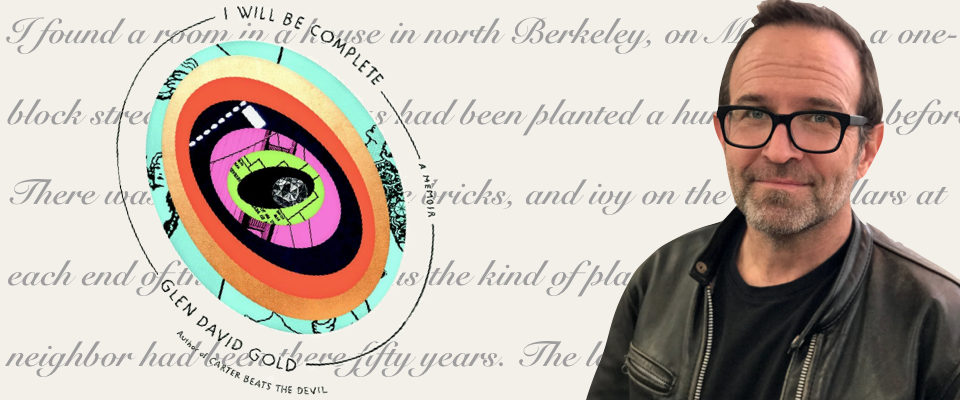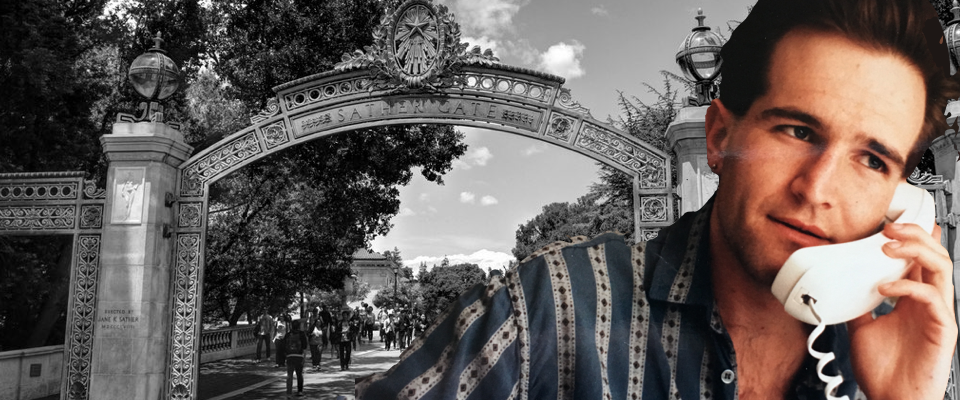The latest issue of CALIFORNIA contains a chapter-length excerpt from I Will Be Complete, the new memoir by acclaimed novelist and UC Berkeley alum Glen David Gold (Carter Beats the Devil, Sunnyside). The book begins with this epigraphic note on its accuracy: “My mother assures me none of this happened.” Gold’s relationship with said mother is the backbone of his book, which the Irish Times calls “subtle but shocking” and the Washington Post describes as “a banquet of vivacity, shrewdness and wit, a soiree of heart-wreck wised up by humor.” Writer Mary Ladd asked Gold to talk about the new work. The following is an edited and condensed version of their exchange.
California Magazine: Why did you decide to write this memoir?
Glen David Gold: Whenever I’ve told stories from my life, people have reacted with amazement. I tried multiple times to write my life story as fiction and no one believed it. First time was as a student in Ishmael Reed’s class. He didn’t believe it. This was a bit alienating, but also motivating.
I liked the idea of flexing the non-fiction muscle after writing two novels. Originally this was going to be seven volumes but Knopf talked me down from that ledge.
What got edited out?
I took out lots of digressions and qualifiers. A whole subplot about male friendship. Ninety percent of my UC Irvine graduate school experience.
What are the ethics of writing about family and relationships?
I don’t know. I mean, really, seriously, I don’t know. Part of me thinks I have no right to tell this story whatsoever and I should be shot for having done so. Another part thinks that as soon as a family knows there’s a writer in its midst they shouldn’t say anything aloud, ever, unless they want it to be quoted back to them 30 years later. I wish I had a better answer to that—I told a friend of mine recently “Don’t worry, I’d never say anything behind your back I wouldn’t also say in print.”
Can readers trust a novelist to write truthful memoir?
I tell my fiction writing students “never let the truth get in the way of a good story” but the reverse is true here: Never let a good story get in the way of the truth. Geoffrey Wolff, my teacher at UC Irvine, was Old Testament in his desire to make sure we reflected the messiness of real life rather than tidying stuff up to reflect our worldviews.
How does writing about yourself differ from writing about other people?
I’d mistakenly thought I could be a floating eye hanging over the proceedings. Turns out I had to account for myself. I think I perversely aimed at the worst possible version of myself, as it was almost relaxing to just constantly throw rocks at me.
Your writing holds up a mirror to yourself but also offers the reader their own mirror to gaze in. Talk about that a bit.
At heart I think we’re all in this life thing together, and we naturally look for similarities of experience so we can better learn how to deal with each other. For a lot of people they don’t have the time or inclination to go down the rabbit hole of self-analysis (the omphaloskepsis is embarrassing), so watching someone else do it is like watching someone climb a mountain or dive a trench. You can share in the feeling of it.
You’ve been in therapy for many years. Writers often say, “Do therapy first. Then write.” Do you agree?
I think so. I could only write about this if it was “cold,” meaning settled in my mind. If I were still trying to cope with it, it would be like trying to draw a portrait of a galloping horse. While in the saddle of the galloping horse.
Your book is heartbreaking but also funny. What is the role of humor in your writing?
Humor’s kinda my meat and drink. It’s hard to make people laugh, and I tend to appreciate literature that’s actually funny. Charles Portis. PG Wodehouse. And, of course, CD Payne.
As an undergrad I took a class with Alan Dundes on urban folklore – he had me read Freud on humor to understand its aggressive tendencies. I wrote a twenty-page paper on a shaggy dog story I loved to tell, The Clown Joke, and by the end of the semester I think I wasn’t funny anymore. Too self-conscious.
But I learned that humor is a way of fighting back against perceived injustice. Here’s a helpful note: If there’s ever an international conflict you don’t understand, note which side has the better sense of humor. They usually have the moral high ground.
What was the toughest part in your memoir to write?
It’s funny, I’d say people would expect that the emotionally crushing scenes were difficult, but they weren’t. For some reason I just couldn’t get the parts where I was happy right. Those took multiple drafts.
But maybe this is helpful to hear: the hardest thing was page one, in the sense that it took me four years to come up with the voice of the book, meaning the tone. I did multiple terrible drafts before I got there, and I only landed the way I did because I kept reading drafts aloud to audiences and listening to how they reacted.
What is the most important part of your writing process?
Wow, that’s hard. I don’t think there’s an actual answer to that. Rewriting? Listening to room tone in crowds when you read stuff aloud? That moment when you’re out on a run and this weird line comes to you and you think it’s good but you aren’t running with a pen and paper so you try to remember it all the way home, only when you get there, it doesn’t make sense anymore, so you sulk and then get out your manuscript and rewrite it anyway? Everything is important, especially the stupid stuff.
Describe the place where you write most.
I’m not much of a “place” guy. I realize I’ve written just as much in my office as my kitchen, and also in cafes. Sometimes on a computer, sometimes long hand. Lately I’ve been writing in my back yard in the mornings because I let the cats out early and have coffee and watch them to make sure the coyotes don’t eat them.
What does your night stand reading pile look like?
Huge. Shame-fueled. Organized by color. In 2018 I seem to have only purchased books with red spines.





















